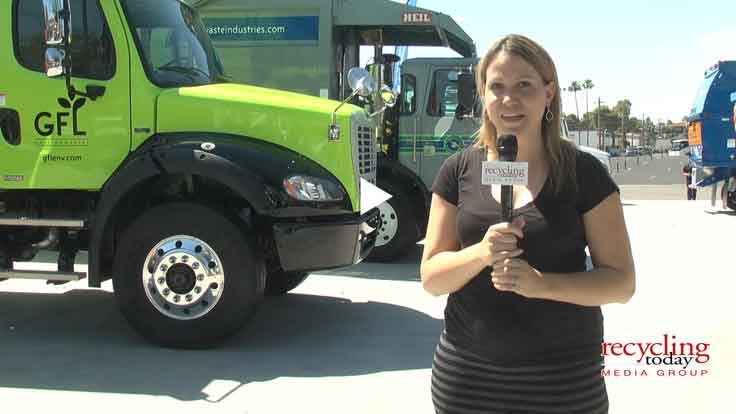Veterans don’t always have an easy time transitioning into civilian work life after serving their country. But many of them are finding they fit right in at Covanta Energy. The waste-to-energy (WTE) company, headquartered in Morristown, N.J., and with more than 40 WTE facilities, has hired hundreds of veterans. Of the company’s 3,000-plus employees, 450—or about 15 percent—are veterans.
One of those employees is T.J. Seifert. The Penn State graduate spent several years in the U.S. Navy, graduating from the U.S. Navy Nuclear Power School & Prototype and going on to become a lieutenant and naval nuclear submarine officer. Seifert worked on nuclear-powered submarines and as a company officer at the U.S. Naval Academy. When he left the service, he wanted to find a job where he could put his military experience and technical credentials to use.
As a regional engineer for Covanta in the Mid-Atlantic, Seifert says he is using “the same skill set but with a different frame of reference.”
Seifert explains, “A lot of the skills I learned in the Navy, being a problem-solver and attention to detail, working with a great team, is both great for what I am doing now as a regional engineer as well as in Covanta itself.”
A Good Fit
When he was first looking for a job after leaving the military, Seifert says he conducted online research, met with recruiters, and attended hiring conferences and career fairs. “I turned over every stone I could,” he says.
Covanta happened to be presenting at one of the career fairs he attended. “I’ve always been about a sense of giving back. That’s why I decided to choose the Navy and give back to the country,” he says. “As I saw Covanta and did more research, I saw that they gave back to the environment as well as the community, and I felt that was something I really wanted to get into.”
After talking to a few of the Covanta staff at the conference, he says he felt like the company would be a good fit. “They had a lot of veterans that I could form a bond with and relate to some of the experience I had and bridged the gap between the navy training I received and the waste-to-energy field,” he says.
Seifert was hired in November 2012 at Covanta’s York, Pa., location. The chief engineer and other key players at the facility are also Navy veterans. He says he was able to pick up much of the technical information in Covanta’s training program right away. And for any areas that weren’t as transferable, the veterans on staff were able to relate the differences.
“Anytime I ever needed help, people here at the company have been really helpful to take the time to explain systems and to explain some of the histories of the plants themselves and give me that extra detail I was looking for,” Seifert says.
Adjustment Period
Seifert is currently working on several different projects. He can’t describe a typical day on the job because he says there isn’t one. He says he has to think on his feet and solve problems as quickly as possible. He also does engineering design work where he researches and tries to find ways to improve engineering and efficiency. In addition, he interacts with key plant operators answering any questions they might have.
“I love the fact that it is not the same thing every day,” says Seifert. “It is a little bit of variety. Being a veteran, I am not used to doing the same thing every day.”
The transition to civilian life can have its challenges, according to Seifert. “Every veteran is used to doing about 90 percent of their life on base,” he explains. Everything from hiring a lawyer to seeking health care could be done on the naval base. Now he has to find all of those services on his own. Working at Covanta has made the adjustment a bit easier.
“What was nice is since there are so many veterans, I’ve been able to ask them questions like, ‘How did you handle this?’” He says his colleagues and the human resources staff at Covanta have been helpful and supportive. “For the most part, I have absolutely no real regrets or reservations about the whole process. It’s been great,” he says.
Seifert sees himself continuing to grow in his career at Covanta in the areas of innovation and efficiency.
“There are a lot of veterans in this organization. It is kind of hard walking into a new industry as an outsider. I was welcomed by Covanta but then I was welcomed by the veterans,” he remarks.
Transferable Skills
Lisa Striebig, director of human resources at Covanta, supports the Mid-Atlantic region for the company’s Virginia, Maryland and Pennsylvania plants. She is part of the team that helped recruit and hire Seifert and hundreds of other veterans.
“The company realizes the importance and value that the veterans bring to the company,” she says. “Their skills are very transferable. In T.J.’s case, coming out of the navy and having some of the engineering skills, he can hit the ground running with a lot of our projects.”
Striebig says Covanta is always looking to recruit the most qualified employees, and tapping veterans has been a great approach.
“Besides the technical skills, having worked with diesel engines and power, they are mature,” she says. “They understand the nature of the shift work we offer here at Covanta.”
According to Striebig, working for Covanta is not an 8-to-5 job. “A lot of times our shifts are 12 hours long, and during outages employees might be working a lot of hours.”
Striebig says veterans can relate to that intense work environment. “They are accustomed to a high level of activity,” she says. “It is not a very sedentary work environment that we have here. They adjust well to our operations and our schedule and have the discipline.”
She adds. “We are very procedure driven. They understand that coming out of the military, so it is a great fit from a skill set and transferable.”
As part of Covanta’s recruitment efforts, it participates in veteran job fairs and military hiring conferences.
In Seifert’s case, Striebig says, “We were looking for a regional engineer that was very project-based, very out-of-the-box thinking, and T.J. was able to demonstrate the different areas that he had worked in and how he progressed and developed throughout his military career.” Striebig adds that Seifert’s experience running a nuclear power plant on a submarine intrigued the company.
Aside from the skills many of these veterans can bring to the table, Striebig says hiring veterans is rewarding on yet another level. “It gives you a sense of pride knowing that you are helping veterans transition, whether they are coming right out of the military or another employer.”
The author is managing editor of Renewable Energy from Waste and can be contacted at [email protected].



